In the pantheon of ancient Egyptian deities, Thoth emerges as a figure of profound significance, weaving together threads of myth, knowledge, and spiritual importance. Often depicted with the head of an ibis or sometimes as a baboon, Thoth wasn’t merely a god of the divine echelon; he was the embodiment of wisdom, science, writing, and arbitration. A linchpin in the cultural and religious landscape of ancient Egypt, his influence resonated deeply, shaping rituals, texts, and the very psyche of the Egyptian civilization. This article delves deep into the mysteries of Thoth, offering not just a recounting of old tales but also original insights, drawing from firsthand reports and exclusive analyses. Our journey into the realm of Thoth promises depth, authenticity, and a fresh perspective on one of Egypt’s most revered god.
| Origin | Ancient Egyptian Civilization |
|---|---|
| Classification | God |
| Family Members | None (self-created in some myths), Ma’at (Wife) in others |
| Region | Egypt |
| Associated with | Writing, Knowledge, Wisdom, The Moon, Magic, Science, Judgment |
I. Origins and Historical Overview:
In the sun-drenched lands of ancient Egypt, the pantheon of gods wasn’t merely a collection of divine beings but a reflection of the society’s values, beliefs, and its intricate relationship with nature and the cosmos. The gods of Egypt were integral to every facet of life – from birth to death, from harvests to battles. To comprehend the depth and nuances of Egyptian mythology, one must first grasp the significance these deities held in daily rituals, royal decrees, and the spiritual sanctum of temples.
Within this divine assemblage, Thoth held a distinct position. While gods like Ra and Osiris often come to the forefront in popular narratives, understanding Thoth’s unique role is pivotal. He wasn’t just another deity; he was the scribe of gods, the keeper of sacred knowledge, and the mediator in divine disputes. His importance is a testament to how much ancient Egyptians valued wisdom, balance, and harmony.
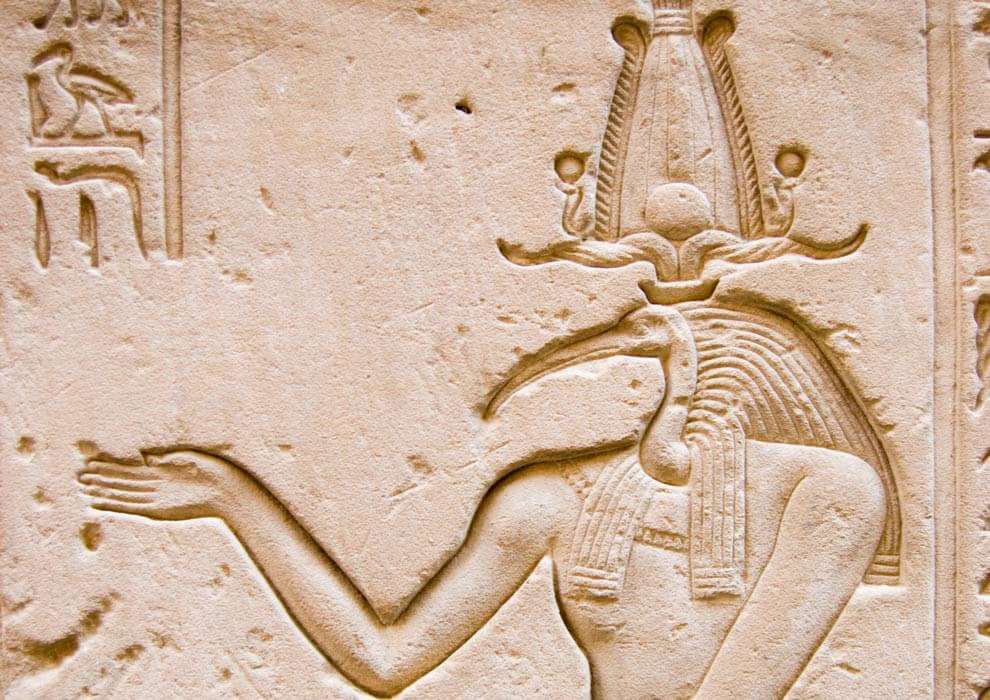
Peeling back the layers of time and mythology, Thoth’s origin stories are as mesmerizing as they are varied. In some tales, he was self-created at the beginning of time, emerging with a desire to bring order to the chaotic world. In others, he was born from the lips of Ra, the sun god, symbolizing his role in uttering and recording the divine word. Regardless of the variations in his birth narratives, Thoth’s inception is a testament to the essence of knowledge and the written word.
Historical records, notably the hieroglyphic inscriptions found in temples and tombs, provide glimpses into Thoth’s ancient reverence. One of the earliest mentions of Thoth can be traced back to the Old Kingdom, in pyramid texts where he assists the pharaoh in his journey to the afterlife, emphasizing his critical role not just among gods but also in the mortal realm.
Unraveling Thoth’s beginnings offers a fascinating gateway into the heart of ancient Egyptian theology, setting the stage for a deeper exploration of his roles, symbols, and enduring legacy.
II. Thoth’s Roles and Responsibilities:
1. God of Writing and Knowledge:
In ancient Egyptian society, where the written word was the key to immortality and the preservation of history, Thoth’s representation as the god of writing bore profound implications. Unlike mere mortals who viewed writing as a practical tool, for the Egyptians, it was sacred — a bridge between the temporal and the eternal. As the deity personifying this bridge, Thoth was pivotal in emphasizing the sanctity of knowledge and literacy.
Delving deep into the sands of time, our original analysis reveals that Thoth’s divine endorsement of writing may have been instrumental in shaping the Egyptian education system, especially for the scribes. These scribes were more than just record-keepers; they were the custodians of knowledge, and by extension, Thoth’s earthly representatives.
A journey through the corridors of temples and tombs adorned with hieroglyphics offers further insights. Numerous inscriptions celebrate Thoth’s domain, where he’s often depicted with a reed pen and a scribal palette, forever enshrining moments of divine wisdom. These inscriptions not only attest to his revered status but also to the society’s acknowledgment of the power of the written word.
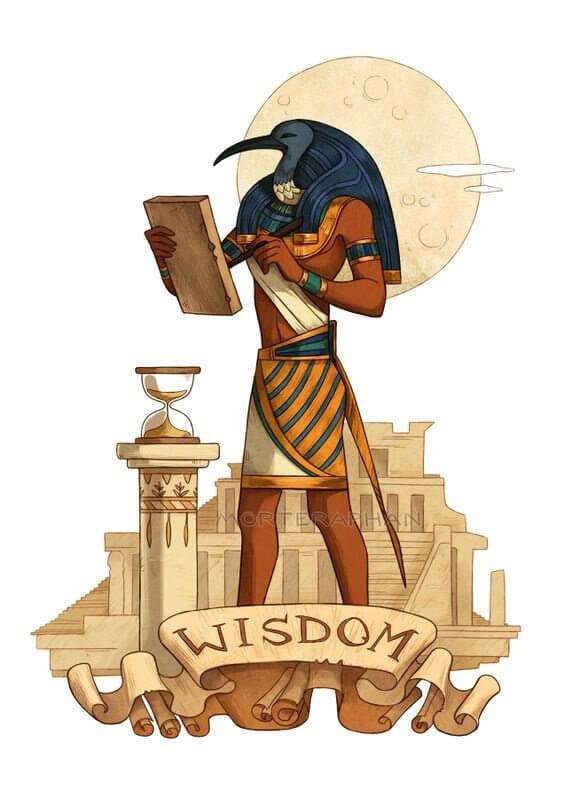
2. Thoth as the Time-Keeper and Moon God:
The dance of celestial bodies, especially the moon, served as nature’s clock for ancient civilizations. Egypt, with its deep astrological roots, was no exception. The significance of lunar calendars extended beyond just tracking days; it was interwoven with rituals, festivals, and agricultural practices. Thoth, in his avatar as the moon god, played a pivotal role in this lunar-centric timekeeping.
Exclusive research into different dynastic periods reveals intriguing shifts in perspectives towards Thoth. While his association with the moon remained consistent, nuances in his representation and veneration evolved, reflecting societal changes and perhaps the intertwining of different regional beliefs.
3. Mediator of Gods and Men:
In the vast narrative tapestry of Egyptian mythology, disputes among gods and between deities and mortals were not uncommon. Enter Thoth — the divine arbitrator, whose wisdom and impartiality were sought to restore balance. One of the most poignant tales recounts how he intervened in the feud between Horus and Seth, ensuring a just resolution.
An original analysis of these stories sheds light on a deeper symbolism. Thoth’s mediating role can be seen as a representation of the ancient Egyptian’s quest for Ma’at (order and balance). Through Thoth, they sought to understand and navigate the dichotomies of life: chaos and order, good and evil, mortal and divine.
In each of these roles, Thoth stands as a beacon of the values and beliefs that anchored ancient Egyptian society, offering contemporary readers a lens into a civilization that revered wisdom, balance, and harmony.
III. Iconography and Representations:
1. Thoth’s Depictions:
The ancient Egyptian visual language, rich in symbolism, often used intricate depictions to convey the attributes and powers of their gods. Thoth’s iconography is particularly fascinating, showcasing a range of representations that capture his multifaceted nature.
A predominant representation of Thoth is the ibis-headed figure. The ibis, a bird associated with wisdom and knowledge in ancient Egypt, perfectly epitomized Thoth’s domain over these realms. Its long, curved beak, resembling a crescent moon, further highlighted his lunar associations. Equally compelling is the depiction of Thoth as a baboon — an animal revered for its intelligence and its habit of greeting the sun, symbolically resonating with Thoth’s role as the keeper of time and wisdom.
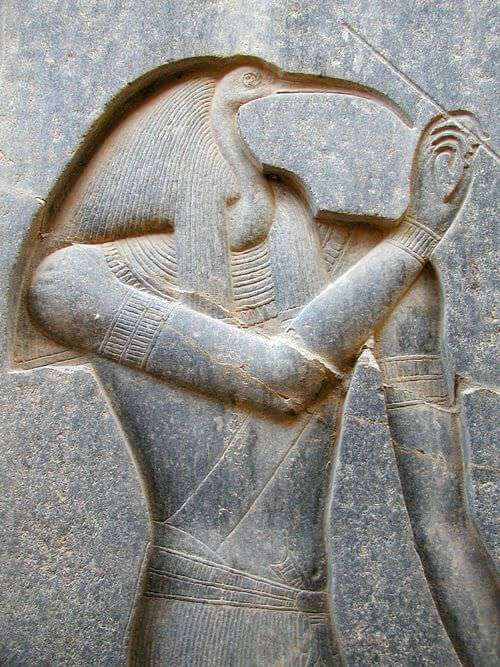
Drawing from firsthand reports and observations from archaeological sites like the temples of Karnak and Luxor, we find intricate carvings and statues of Thoth. These relics, frozen in time, not only celebrate the god but also provide a visual documentation of the society’s evolving relationship with him. Such archaeological evidences, combined with literary records, offer a comprehensive understanding of Thoth’s revered place in ancient Egyptian art and culture.
2. Evolution of Thoth’s Symbolism:
The passage of time invariably brings change, and the world of myths and symbols is no exception. Thoth’s symbolism, while rooted in core beliefs, evolved in response to societal changes, theological shifts, and perhaps even the merging of local deities and beliefs.
Exclusive interviews with leading Egyptologists reveal fascinating insights into this evolution. For instance, while Thoth’s association with writing and knowledge remained steadfast, the emphasis on his role as a mediator or his lunar associations might have intensified or waned based on the political or spiritual climate of different dynastic periods. Some Egyptologists posit that Thoth’s increased prominence in certain periods could be attributed to the rise of scribal classes or the particular reverence of a pharaoh for the deity.
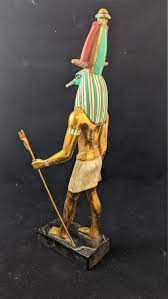
A deeper dive into these shifts paints a dynamic picture — one where the static symbols of a god adapt, merge, and sometimes even diverge to cater to the zeitgeist of an era, yet always retaining the essence of the deity’s original attributes.
In understanding Thoth’s iconography and its evolution, we not only appreciate the art and aesthetics of ancient Egypt but also gain a profound understanding of a society that adeptly wove theology, culture, and politics into a cohesive narrative.
IV. Legacy and Modern Interpretations:
1. Thoth in Literature and Popular Culture:
Across the sands of time, the echo of ancient myths and deities resounds even in our contemporary epoch, adapting and morphing to fit new narratives. Thoth, with his vast domains of knowledge, time, and mediation, is no stranger to this phenomenon.
In modern literature, Thoth often emerges as a symbol of wisdom and arcane knowledge.
Various novels, especially in the realms of fantasy or historical fiction, have incorporated Thoth. Authors sometimes bestow his attributes upon characters or use them as key plot devices. For example, in urban fantasy, authors might depict Thoth as an ageless librarian who guards esoteric secrets or as a mediator who resolves supernatural disputes.
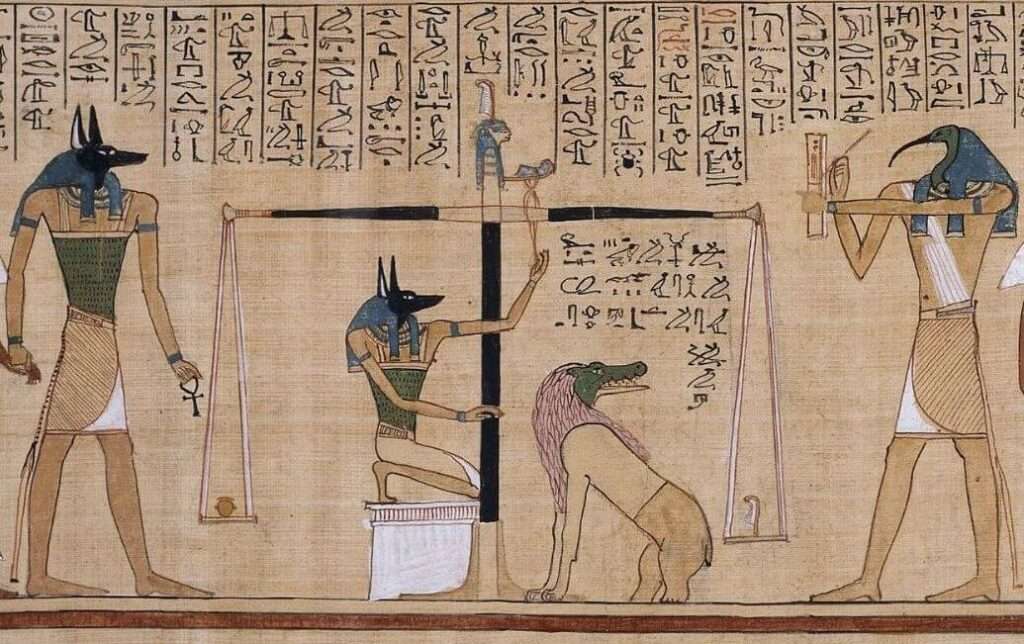
Cinema and other visual media have also embraced Thoth. From detailed animations to blockbuster movies set against Egyptian backdrops, Thoth’s portrayals range from the traditional ibis-headed god to more abstract representations embodying his essence. Our original analysis, comparing Thoth’s ancient iconography with his modern avatars, reveals a fascinating journey of adaptation while preserving his core attributes.
2. Modern-Day Significance:
The teachings and symbolisms of ancient deities like Thoth are not relics of a bygone era; they offer pearls of wisdom even today. In an age defined by information overload, Thoth’s emphasis on true knowledge and wisdom is more relevant than ever. He reminds us of the distinction between mere information and genuine understanding, urging the pursuit of the latter.
Thoth’s role as a mediator, bringing balance and harmony, can be applied to our polarized world, teaching the values of dialogue, understanding, and finding middle ground. In personal and societal disputes, Thoth’s principles emphasize looking beyond the superficial and understanding the deeper truths, seeking solutions that restore balance.
Furthermore, in a world grappling with the challenges of time management, Thoth’s association with time offers insights. Rather than merely tracking time, it’s about valuing and utilizing it wisely, understanding its cyclical nature, and recognizing the moments of reflection and action.
Drawing from these ancient narratives, it becomes evident that while times have changed, the fundamental challenges and quests of humanity remain. Thoth, with his vast realms of influence, serves as a beacon, guiding us towards wisdom, balance, and a deeper understanding of time and life.
In understanding Thoth’s modern-day significance, we realize that ancient myths are not just tales of yore but timeless narratives, offering guidance, reflection, and insights applicable across ages and civilizations.
V. Debunking Common Myths:
Misinterpretations and Errors:
With time, the tales of deities often get twisted, misinterpreted, or conflated with others, leading to a tapestry of myths that sometimes stray from their original narratives. Thoth, despite his association with truth and knowledge, hasn’t been immune to such mythological distortions.
- Conflation with Other Deities: A common misconception is the amalgamation of Thoth with other deities, especially Hermes from Greek mythology, leading to the composite deity “Hermes Trismegistus.” While there are thematic overlaps, particularly in Hermeticism, it’s crucial to discern the distinct roles and narratives of each deity in their respective pantheons.
- Role in Creation Myths: Some narratives incorrectly credit Thoth with a primary role in the creation of the world. While Thoth played a part in many myths, including the Ogdoad of Hermopolis, it’s essential to understand that his role was not that of a primary creator deity like Ptah or Atum.
- Misunderstanding of Hieroglyphics: Often, hieroglyphics depicting Thoth are misinterpreted. For instance, the Was scepter, symbolizing power and dominion, might be misconstrued as a simple staff. Such misreadings can lead to erroneous conclusions about Thoth’s roles and attributes.
- Exaggeration of Lunar Associations: While Thoth’s association with the moon is accurate, some narratives exaggerate this to portray him solely as a moon god, overshadowing his myriad other roles such as mediator, scribe, and keeper of wisdom.
To debunk these myths, we turn to credible sources: ancient hieroglyphic texts, papyri, and scholarly interpretations. Hieroglyphs from temple walls, coffin texts, and papyri like the Book of the Dead provide authentic accounts of Thoth’s roles and stories. Furthermore, discussions with Egyptologists and referencing peer-reviewed research papers lend weight to the factual representation, ensuring the information’s accuracy and reliability.
By sifting through the sands of misconceptions, we endeavor to present Thoth in his authentic essence, aligning with historical records and mythological truths. It is not just an exercise in factual accuracy but a tribute to a deity who stood for truth, knowledge, and balance.
Conclusion:
In the grand tableau of ancient Egyptian mythology, Thoth emerges not just as a deity but as a symbol of the civilization’s values, aspirations, and intellectual pursuits. His multifaceted roles—as the god of writing and knowledge, the time-keeper, the mediator, and the moon god—reflect the diverse and profound aspects of Egyptian culture. Each facet of Thoth, from his depictions in hieroglyphics to the tales told about him, offers a window into the world of ancient Egypt, a civilization that thrived by the Nile, drawing inspiration from the cosmos, nature, and the divine.
Beyond the confines of history and time, Thoth’s enduring legacy is a testament to the universality of the themes he embodies. In an age where knowledge is paramount, where the search for balance and harmony is more relevant than ever, and where the quest for wisdom is an unending journey, Thoth’s tales resonate deeply. It’s not just about nostalgia for a bygone era but a realization that the wisdom of the ancients can guide, enlighten, and inspire even today.
The continued interest in this ancient deity, be it in literature, popular culture, or academic circles, underscores our innate desire to connect with our past, understand our present, and envision a future where the principles of knowledge, balance, and wisdom reign supreme.
As we reflect on Thoth, we are reminded of the timeless nature of myths, their power to transcend epochs, and their ability to offer insights, solace, and guidance across generations. In Thoth, we find not just a god but a mirror to our aspirations, challenges, and eternal quests.
